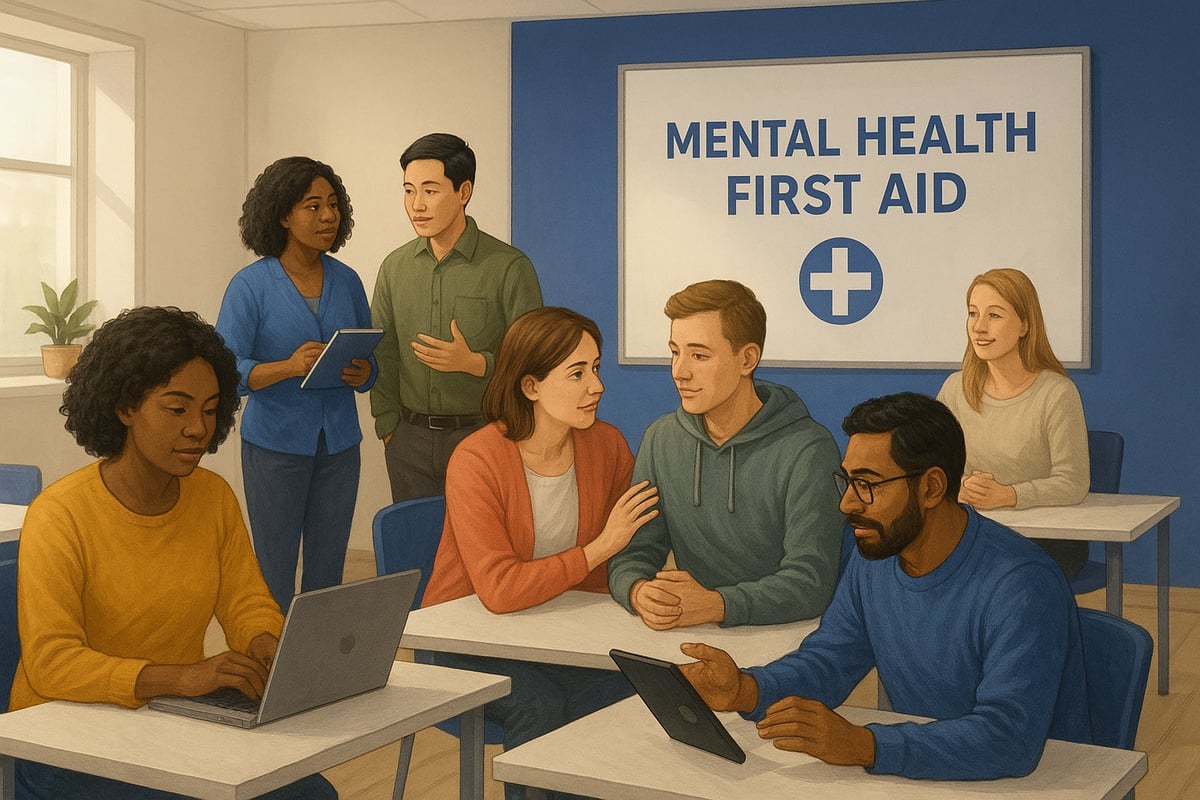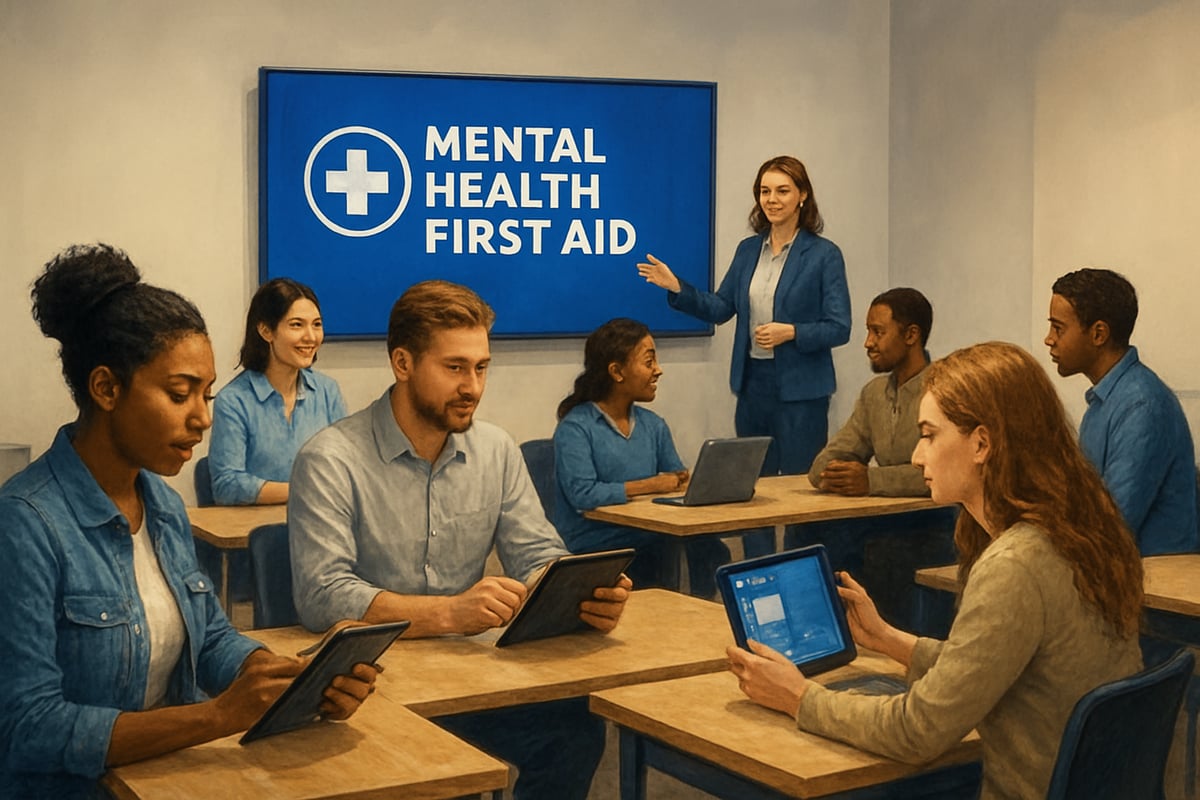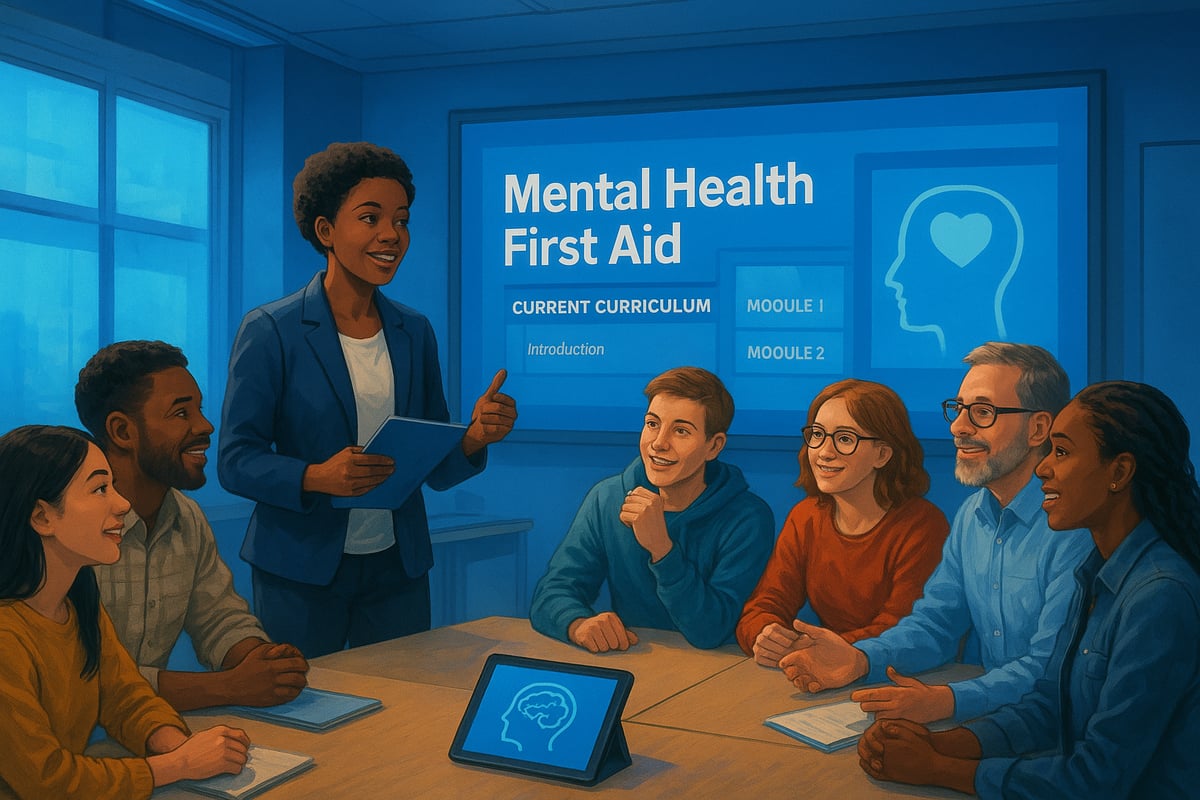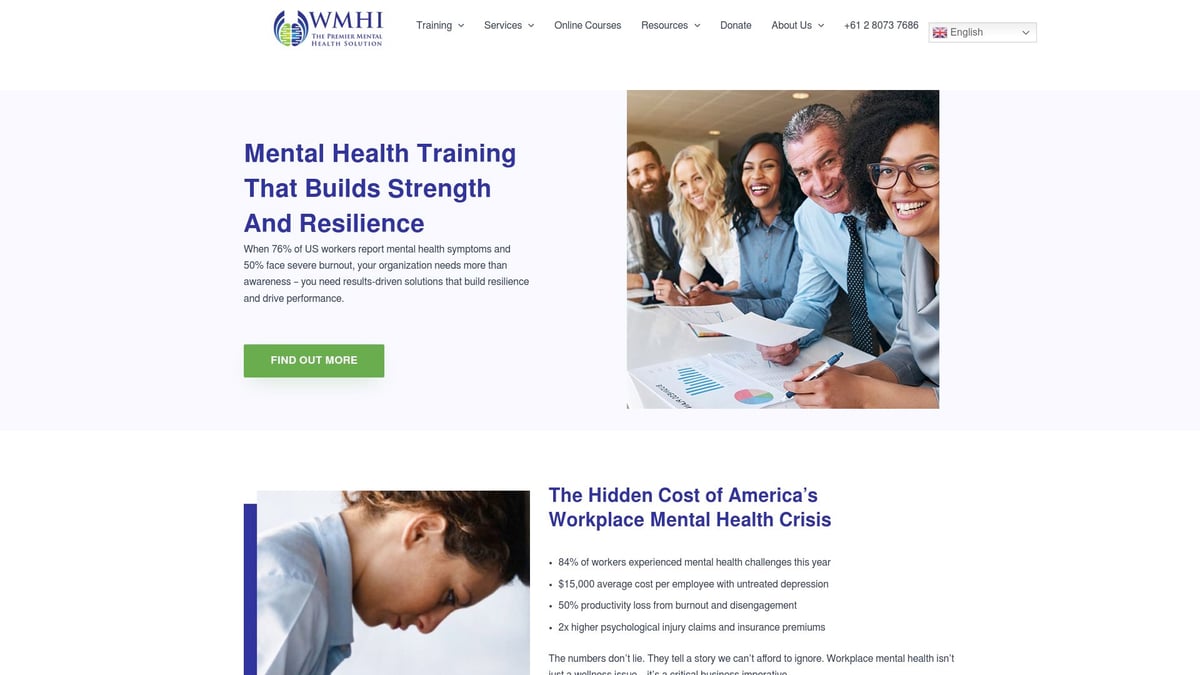Imagine being the person everyone looks to in a mental health emergency, confident that you know exactly what steps to take. With the right training, you can become that support for your workplace, school, or community. This guide gives you a complete roadmap to earning your mental health first aid cert in 2025, empowering you to help others and create safer environments. Discover what Mental Health First Aid is, why certification matters, the updated process for 2025, and practical ways to put your skills to use. Take the first step toward making a meaningful difference.
Understanding Mental Health First Aid: What & Why
Imagine being equipped with the skills to respond calmly when someone faces a mental health challenge. That is the power of earning a mental health first aid cert. This section explains what Mental Health First Aid (MHFA) is, why certification matters, who should consider it, and the types of courses available in 2025.

What is Mental Health First Aid?
Mental Health First Aid (MHFA) is a practical, evidence-based training designed to teach people how to recognize, respond to, and refer individuals experiencing mental health problems. The program began in Australia in 2000 and has since spread globally, reaching millions of participants in dozens of countries.
MHFA focuses on three core principles: recognizing the early signs of mental health issues, responding with effective support, and referring individuals to professional help when needed. Unlike traditional first aid, which addresses physical injuries, a mental health first aid cert prepares you for real-world situations like supporting someone with anxiety or responding to a potential crisis.
You might use these skills in your workplace, at home, or within your community, providing crucial support when it matters most.
The Importance of MHFA Certification
Why is a mental health first aid cert so valuable today? Mental health challenges are on the rise, with 1 in 5 adults experiencing a mental illness each year. Certification helps break down stigma, fosters supportive communities, and promotes early intervention, which can dramatically improve outcomes.
In the workplace, 61% of employees report mental health impacts, making these skills vital for leaders and teams. Gaining certification also boosts your personal confidence when facing crisis situations. To dive deeper into these benefits, see The importance of Mental Health First Aid.
By becoming certified, you not only help others but also empower yourself to be an effective advocate for wellbeing.
Who Should Get Certified?
A mental health first aid cert is beneficial for anyone who interacts with others regularly. Employees, HR professionals, educators, and managers can use these skills to create safer, more supportive environments. Parents, caregivers, and community leaders also find value in understanding how to respond to mental health needs.
Organizations seeking compliance and improved wellbeing are increasingly encouraging staff to get certified. Imagine a school staff member trained in MHFA, who prevents a student crisis from escalating—a powerful example of the difference this certification can make for individuals and organizations alike.
Types of MHFA Courses Available in 2025
There are several mental health first aid cert options in 2025, tailored to different audiences and needs. Courses include Adult, Youth, Workplace, and specialized modules for veterans and first responders. Delivery formats now range from in-person to blended and fully online options, making training more accessible.
New for 2025 are digital enhancements and additional modules addressing emerging issues. Here is a quick comparison:
| Course Type | Audience | Format | Duration |
|---|---|---|---|
| Adult | General public | In-person/Online/Hybrid | 8–12 hours |
| Youth | Educators, parents | In-person/Online/Hybrid | 8–12 hours |
| Workplace | Employees, leaders | Online/Hybrid | 6–8 hours |
| Specialized | Veterans, responders | In-person/Online | 6–12 hours |
Choosing the right course ensures your mental health first aid cert meets your goals and fits your schedule.
The 2025 Certification Process: Step-by-Step Roadmap
Embarking on your mental health first aid cert journey in 2025 involves a clear, actionable process. Each step is designed to build your confidence and competence, ensuring you are fully equipped to support others in times of need. Here is your detailed roadmap.

Step 1: Research and Select the Right Course
Your first step toward a mental health first aid cert is identifying the course that aligns with your goals. Consider your environment: are you seeking skills for the workplace, youth settings, or community outreach?
Look for accredited providers with transparent credentials and up-to-date content. Compare online, in-person, and hybrid options, keeping in mind your preferred learning style and any accessibility needs. To explore current offerings, check our latest course catalogue is out now for a comprehensive list of MHFA training options for 2025.
Assess course duration, available languages, and any prerequisites. Investing time in this research stage ensures your mental health first aid cert journey starts on the right foot.
Step 2: Register and Prepare for Training
Once you have chosen your ideal mental health first aid cert course, begin the registration process. This typically involves completing an online form, paying course fees, and confirming any prerequisites. Some providers offer financial aid or employer sponsorship, so inquire about these options if cost is a concern.
Prepare by reviewing required materials and any pre-reading assignments. Schedule your training to minimize conflicts and maximize your focus. Setting aside dedicated time and organizing your materials ahead of the first session will help you make the most of your mental health first aid cert experience.
Step 3: Participate in MHFA Training Sessions
During the training, you will engage in a mix of lectures, discussions, and interactive role-plays. These sessions are structured to develop practical skills essential for your mental health first aid cert, such as risk assessment, active listening, and providing non-judgmental support.
Expect group activities and scenario-based learning, which reinforce key concepts and foster peer collaboration. Trainers are often experienced mental health professionals who create a supportive environment for learning. Remember, 96% of participants report increased confidence after completing their mental health first aid cert training.
Step 4: Complete Assessment and Certification
To earn your mental health first aid cert, you must complete an assessment. This may include a written test and practical demonstrations of your skills. Providers will clearly outline the passing criteria and any retake policies, so you know what to expect.
Successful candidates receive a digital or physical certificate, valid for three years in most cases. On assessment day, stay calm, review your notes, and trust the skills you have developed throughout your mental health first aid cert training.
Step 5: Maintain and Renew Your Certification
Maintaining your mental health first aid cert ensures your knowledge stays current and relevant. Plan to participate in refresher courses and continuing education, especially as new protocols emerge in 2025.
Track your certification’s expiry date and set reminders for renewal. Some employers or professional bodies may require proof of ongoing certification, so keep documentation organized. Staying certified not only benefits you but also strengthens your capacity to support those around you with your mental health first aid cert skills.
Tips for Success During the Certification Journey
Maximize your mental health first aid cert journey by actively engaging in sessions and building a network with fellow trainees. Utilize official resources, such as guides and online communities, to reinforce your learning.
Set personal goals and reflect on your progress throughout the course. Many graduates share that real-life testimonials and peer support made a significant difference in their confidence. Remember, your mental health first aid cert is not just a credential—it is a commitment to supporting your community.
What’s New in Mental Health First Aid for 2025?
Staying up to date with your mental health first aid cert is essential as the landscape of mental health support continues to evolve. In 2025, significant changes are coming to both the curriculum and how training is delivered. These updates are designed to make your mental health first aid cert more impactful and accessible, ensuring you are prepared for modern challenges. Here is what you can expect this year.

Updated Curriculum and Content Enhancements
The mental health first aid cert curriculum for 2025 now integrates trauma-informed care as a core principle. This means you will learn how to recognize and respond to trauma with greater sensitivity and skill.
Other key enhancements include:
- Expanded modules on workplace wellbeing and remote support
- Fresh case studies reflecting post-pandemic realities
- Interactive digital resources for hands-on learning
- Curriculum improvements based on participant feedback
These updates ensure your mental health first aid cert remains relevant in an ever-changing world. The focus is on equipping you with practical, up-to-date tools to support those in need.
Innovations in Training Delivery
Training for your mental health first aid cert is now more flexible than ever. Virtual reality and simulation-based training have become standard, allowing you to practice real-life scenarios in a safe environment.
Additional innovations include:
- Mobile app support for ongoing skill development
- Multilingual and adaptive content for increased accessibility
- Self-paced microlearning modules for busy schedules
These advancements help make the mental health first aid cert accessible to a broader audience, regardless of location or learning style.
Regulatory and Industry Changes
In 2025, new accreditation standards have been introduced for mental health first aid cert providers. Employers in certain industries now require certification as part of their wellbeing programs.
Key regulatory updates:
- Recognition of the mental health first aid cert for professional development credits
- Stricter compliance with global workplace wellbeing regulations
- Organizations are increasingly integrating certification into onboarding processes
These changes highlight the growing value of the mental health first aid cert across industries.
Trends in Mental Health First Aid Adoption
Demand for the mental health first aid cert continues to surge, with over 3 million people certified globally. Schools, corporations, and public sector organizations are investing in large-scale training initiatives.
Trends to watch in 2025:
- Stronger partnerships with mental health organizations
- Government initiatives to expand access to certification
- Real-world impact stories from recent adopters
For a deeper look at the movement’s growth and milestones, explore the MHFA Summit 2025: Celebrating 25 Years, which highlights the evolution and future direction of Mental Health First Aid.
Applying Your MHFA Skills: Real-World Scenarios
Gaining your mental health first aid cert means you can step in and make a real difference when someone is struggling. Applying these skills in daily life is about more than knowledge, it is about confidence, empathy, and action. Let us explore how your mental health first aid cert can be used in a range of real-world settings.
Supporting Individuals in Crisis
Recognizing the early signs of a mental health challenge is a core benefit of earning your mental health first aid cert. You might notice a friend withdrawing, a coworker showing signs of distress, or a family member acting out of character. In these moments, your training empowers you to approach with empathy and discretion.
Key steps include:
- Observing changes in behavior or mood
- Initiating a private, supportive conversation
- Using de-escalation and safety planning techniques
- Referring them to professional help when needed
For example, with your mental health first aid cert, you may assist a coworker who is overwhelmed by stress, listen without judgment, and connect them to resources. This prompt, compassionate response can prevent a situation from escalating.
MHFA in the Workplace
Applying your mental health first aid cert in the workplace is vital for fostering a culture of psychological safety. As a certified colleague, you play a crucial role in peer support, helping to address burnout, stress, and absenteeism before they become larger issues.
Employers increasingly value this certification, recognizing its impact on morale and productivity. You will also need to consider legal and ethical boundaries, ensuring confidentiality and appropriate escalation.
If you are looking for practical ways to support mental health in the workplace, your mental health first aid cert provides the structure and tools needed for real change. Imagine an HR team implementing MHFA across departments, leading to more open conversations and early interventions.
MHFA in Schools and Youth Settings
With a mental health first aid cert, educators and school staff are better equipped to identify youth-specific risk factors such as bullying, academic pressure, or social isolation. Engaging parents, teachers, and students in open dialogue creates a supportive environment where early signs are not ignored.
Prevention is key. By collaborating closely with school counselors and using MHFA techniques, staff can intervene before a crisis escalates. A recent case showed that a timely conversation with a struggling student, guided by MHFA principles, prevented a potential crisis and fostered resilience.
Your mental health first aid cert also empowers you to educate others, helping to build a safer, more inclusive school community.
Community and Public Settings
The reach of a mental health first aid cert extends to community centers, public events, and spaces where high-risk or marginalized groups may need support. Volunteers and leaders trained in MHFA can quickly identify substance use issues, suicide risk, or acute distress.
Responding effectively involves building local support networks and connecting individuals to appropriate resources. For example, a community volunteer with a mental health first aid cert may notice someone in crisis at a public event and step in with calm, effective support, making a significant difference in outcomes.
Your knowledge helps reduce stigma and builds trust in community settings.
Measuring Impact and Ongoing Development
Tracking the impact of your mental health first aid cert is essential for both personal and organizational growth. Many organizations report measurable improvements after MHFA training.
| Outcome | Percentage Improvement |
|---|---|
| Reduced crises | 79% |
| Improved overall wellbeing | 79% |
| Increased confidence in response | 96% |
Collecting feedback and success stories helps you refine your skills and advocate for wider MHFA adoption. By staying engaged with ongoing training and advanced modules, you ensure your mental health first aid cert remains a powerful tool for leadership and advocacy, supporting your lifelong commitment to mental health.
Choosing the Right MHFA Provider: What to Look For
Selecting a mental health first aid cert provider is a crucial step in your certification journey. The right organization ensures you gain practical skills, current knowledge, and a supportive learning environment. Let’s break down the main factors to consider before enrolling.
Accreditation and Trainer Expertise
When evaluating a mental health first aid cert provider, accreditation should be your starting point. Choose organizations recognized by national or international MHFA bodies. Accredited providers adhere to rigorous standards, ensuring their curriculum stays up to date.
Trainer expertise is equally vital. Look for courses led by mental health professionals with experience in crisis intervention. Review provider track records, alumni testimonials, and instructor profiles. Be cautious of programs with outdated content or unclear credentials.
A quick comparison can help clarify your options:
| Factor | Accredited Provider | Non-Accredited Provider |
|---|---|---|
| Recognized Certification | Yes | No |
| Current Curriculum | Yes | Uncertain |
| Qualified Trainers | Yes | Varies |
| Student Support | Strong | Limited |
Choosing a reputable mental health first aid cert provider lays the foundation for quality training.
Course Flexibility and Accessibility
A mental health first aid cert should be accessible to everyone, regardless of schedule or learning needs. Top providers offer a variety of delivery formats: online, hybrid, and in-person. This flexibility allows you to select what fits your routine best.
Check for language options and accommodations for disabilities, such as captioning or sign language support. Customization is another plus, especially for organizations seeking tailored MHFA programs.
Scheduling options matter—some providers offer evening or weekend classes, while others support self-paced eLearning. For instance, remote teams can benefit from online modules, making it easier to complete a mental health first aid cert without geographical barriers.
Support, Resources, and Post-Certification Opportunities
Sustaining your mental health first aid cert skills requires ongoing access to quality resources. Leading providers offer toolkits, helplines, and peer networks to support your continued development. Alumni groups and online forums can help you connect with others, share experiences, and stay motivated.
After certification, many organizations provide advanced MHFA modules and refresher courses. These opportunities allow you to deepen your expertise as your needs evolve. For example, joining a local MHFA support group can offer valuable real-world insights and ongoing encouragement throughout your journey.
Workplace Mental Health Institute: Leading MHFA Training for Organizations
The Workplace Mental Health Institute (WMHI) stands out as a top choice for organizational mental health first aid cert programs. WMHI’s accredited training is practical, skills-based, and strengths-focused, with a proven track record of measurable results.

Their unique approach emphasizes building psychological safety—a core MHFA principle explored in Building psychological safety. WMHI reports significant impacts, including a 33% reduction in absenteeism and over 50% fewer psychological injury claims.
Programs are customizable for diverse workplaces, delivered by expert professionals, and accessible internationally. Whether you are a leader or employee, WMHI offers tailored solutions to help your organization thrive.
FAQs and Resources for Your MHFA Journey
Embarking on your mental health first aid cert journey can feel overwhelming at first. With so many options, requirements, and resources, it is vital to have clear answers and guidance. This section addresses the most common questions, financial considerations, helpful resources, and ways to stay engaged long after you earn your certification.
Common Questions About MHFA Certification
When considering a mental health first aid cert, several questions often arise. How long does the certification last? Most certifications remain valid for three years, after which a refresher is required. Is the mental health first aid cert recognized internationally? Yes, many countries recognize it, but always check local requirements.
Can you renew online? In many cases, yes, especially with the rise of digital training options. If you do not pass the assessment, you usually have the opportunity to retake it. There are no strict age or professional background requirements, making the mental health first aid cert accessible to a wide audience.
For a glimpse into course availability, see this Mental Health First Aid Training November 25, 2025 session, which demonstrates how regularly new training dates are offered.
Financial Considerations and Funding Options
Understanding the costs associated with a mental health first aid cert helps you plan ahead. Typical course fees may range from $50 to $250, depending on the provider, format, and location. Many organizations offer group discounts, and some employers will sponsor employees seeking certification.
Scholarships and grants are sometimes available, especially for educators, non-profits, or those working in high-need communities. In certain cases, the mental health first aid cert may count as a tax-deductible professional development expense.
For large companies, covering the mental health first aid cert for all staff can be a strategic investment in workplace wellbeing and compliance.
Top Resources for MHFA Students
Reliable resources are essential for anyone earning a mental health first aid cert. Start with official MHFA organizations, which provide up-to-date course information, toolkits, and guidelines. Recommended reading lists and digital toolkits can deepen your knowledge.
Online forums and peer support groups offer valuable networking and shared experiences. Apps and digital learning platforms can reinforce your skills even after the course. If you are interested in instructing, explore Find Instructor Training for details on becoming a certified instructor.
Credible mental health helplines ensure you always have support, both during and after your mental health first aid cert journey.
Staying Informed: Latest Research and News
Keeping current with mental health first aid cert advancements is key for ongoing effectiveness. Subscribe to leading journals and publications in the mental health field, and attend upcoming MHFA conferences or webinars for networking and learning opportunities.
Newsletters and email updates from MHFA organizations deliver the latest protocols, research, and course updates directly to your inbox. Social media groups and online communities connect you with peers, trainers, and advocates worldwide.
For example, the annual MHFA summit highlights emerging trends and practical applications, helping you stay ahead in your mental health first aid cert practice.
Building a Lifelong MHFA Practice
A mental health first aid cert is just the beginning of your contribution to safer, healthier communities. Continue your education with advanced modules or specialty courses, and consider volunteering as an MHFA advocate in your workplace or local area.
Mentor new trainees or join alumni groups to stay engaged. Integrate the mental health first aid cert principles into your daily interactions and professional responsibilities.
One inspiring case: A manager with a mental health first aid cert leads their workplace wellbeing committee, fostering a culture of support and resilience.
Additional Support and Helplines
Support does not end once you complete your mental health first aid cert. National and local mental health helplines are available around the clock for immediate assistance. Crisis text and chat services provide confidential help when you need it most.
Access emergency support if you or someone else is in acute distress. Directory listings of mental health organizations offer pathways to specialized care. Always follow guidelines for seeking further assistance and encourage others to do the same.
As you’ve seen throughout this guide, becoming Mental Health First Aid certified is a powerful way to make a real difference—whether you’re supporting colleagues, leading a team, or building a more resilient workplace. By investing in practical, strengths-focused training, you’re not just gaining essential skills; you’re helping to foster a more supportive and productive environment for everyone. If you’re ready to take the next step or want to explore how these programs can be tailored for your organization, I encourage you to Find Out More about the options available for 2025 and beyond.


